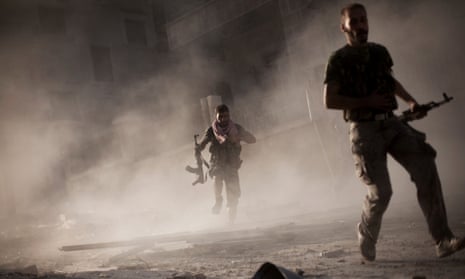British airstrikes on Raqqa will be pointless in the fight against Isis if moderate anti-Assad forces do not get the support they have been promised, David Cameron has been warned.
The warning comes from fighters and political advisers for moderate Syrian factions. All have called for weapons and tactical assistance, but are gloomy about this ever reach them after years of western promises and little practical aid.
They also said that Russian airstrikes on anti-government rebels are sapping their ability to take on Isis in its self-declared capital, Raqqa.
“Cooperating with the moderate forces fighting on the ground is essential, otherwise the airstrikes are not going to be useful at all,” said Mohammad al-Hassoun, commander of a small group called Fursan al-Huria, or Knights of Freedom, north-east of Aleppo.
He started the group in early 2012, and at its peak commanded more than 400 fighters, but now has less than half that many. Dozens were lost fighting Isis and others drifted away after they failed to secure sufficient weapons or financial support.
A coordinator for Free Syrian Army (FSA) groups now fighting Isis said the UK would have to shift policy, and increase its contacts on the ground, for anything to reach the fighters making real progress against the extremists.
“The coalition are supporting inactive groups from the FSA, the wrong groups, which gives the jihadis the opportunity to continue and advance and take liberated areas,” said Ahmad Shhab, also political adviser to a smaller group. “Another problem, the Russians are fighting against everyone fighting Isis, and bombing their areas.”
“Fighting Isis is about 50% of our job, because we are fighting on two fronts. Once we finish one side we will be free to fight the other.”
Bombing Isis oil infrastructure is already hitting its financial base, Hassoun said, but its opponents need to take the whole Turkish border with the help of ground troops so they can stop the supply of another key resource for the Islamist group, foreign recruits.
“Isis has two key resources, one is financial and one is human. Finally the coalition understands that those people are making money from the oil, and have started to bomb the oil, which is useful to cut their financial revenue,” he said. “If the FSA controlled the area [along the border] we could cut their human resources off too.”
Commanders’ hopes for new supplies range from stinger missiles to target Russian and Assad regime aircraft, which all groups want but know they will not get off western powers, to much more realistic demands for assault and sniper rifles. Several said they would also ask for tactical support in areas like mine detection.
“The British role was negative because they were just talking and doing nothing in Syria,” said Abu Qutaiba, a former fighter who is now a media and political activist for several groups. “Of course I support the airstrikes, but it depends how they do it. Even though its too late, I think any people could be involved against Isis are welcomed.”
Ultimately many fear efforts to tackle Isis will be undermined by Assad’s staunch support from Russia and other allies, who Syrians believe see the jihadis as a lesser problem.
“Is it going to be useful for the British and others to bomb? The problem is the big powers have a disagreement on who is going to fight who,” said Shhab. “Some say their priority is Isis, while for the others the priority is to finish the opposition and the FSA and the Syrian revolution in the end.”
Additional reporting by Mohammad Almahmoud
